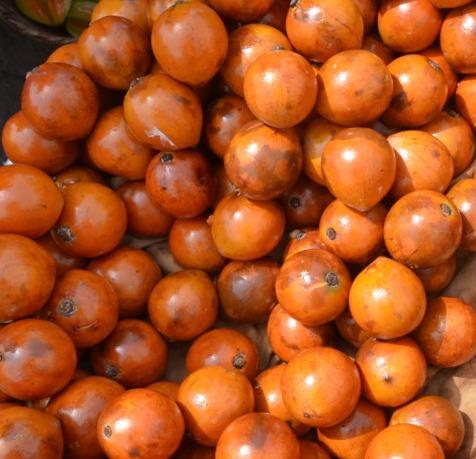How much do you know about soursop, cucumber, pineapple, and watermelon? To a layman, these fruits are merely beneficial for their refreshing juices, as well as the fact that they can be taken as snacks. However, as a group of scientists have recently noted, there’s so much to these fruits than most of us already know.
Researchers from both the Department of Biochemistry, College of Natural and Applied Sciences, Western Delta University, Oghara, Delta State, Nigeria; and the Department of Biochemistry, Faculty of Life Sciences, University of Benin, Benin City, Edo State, Nigeria, have found that soursop, cucumber, pineapple, and watermelon, possess considerable concentrations of phytochemicals to shield the regular consumers from cancer, heart attacks, and other infections.
Their findings were contained in a report published in the latest edition of the Nigerian Journal of Pharmaceutical and Applied Science Research and titled, “In Vitro assessment of proximate and phytochemical quantifications of some edible fruits”.
According to the lead author, Apiamu Augustine, the research was conducted to ascertain comparatively, the proximate and phytochemical compositions of these edible fruits: Citrullus lanatus (watermelon), Cucumis sativus (Cucumber), Ananas comosus (pineapple) and Annona muricata (soursop). He added that he hoped their findings will also boost regular consumption of the fruits, which are potential preventive agents of chronic diseases.
Findings from the proximate and phytochemical analysis on wet weight basis among the four fruits revealed that there was statistical significance. The analysis further showed that watermelon had the highest total fat, crude fibre and moisture contents (0.24, 0.99 and 41.97 per cent) respectively but least in total carbohydrate (45.26 per cent) ; while soursop exerted the highest ash, crude protein and total carbohydrate contents (0.39 per cent, 13.34 per cent and 74.66 per cent) but least in total fat and moisture contents; 0.10 per cent and 10.97 per cent respectively.
The phytochemical analysis indicated comparatively that soursop had the highest concentrations of phytate, oxalate, tannin, phenol and alkaloids among other fruits; while pineapple, cucumber and watermelon had least levels of phytate, oxalate, phenol tannin and alkaloid respectively.
According to the authors, “in view of the appreciable levels of the nutrients and phytochemicals in the fruits, the results therefore suggest that regular consumption of these fruits would be safe for human health and effective management of some pathological conditions.”
Earlier studies had stressed the health benefits of regular consumption of fruits and vegetables. This is line with the recommendation of World Health Organisation (WHO) and the Food and Agricultural Organisation (FAO) that optimal diet for everyone is a low-fat and fibre diet, rich in complex carbohydrate and characterised by a frequent consumption of fruits and vegetables at least 400g daily as well as whole-grains, cereals and legumes at least 30g daily.
Nutritionists also maintain that the main contribution of fruits in nutrition is vitamins and the main source from which humans and animals derive their vitamins is from fruits and vegetables. Thus, fruits and vegetables provide vitamins and minerals in quantities high enough to provide the body with its needs for daily survival and healthy living.
Detailed description and nutritive values of the fortifiers
Soursop, which is known scientifically as Annona muricata L.(Annonaceae family), is described by many other common names such as guanabana, graviola, corossol, guyabano, depending on the geographic location of the plant . It is a heavily fruited, low-branching tree crop belonging to the family “Annonaceae” with about 60 representative species known mostly for its edible fruits referred to as Anona.
The fruits are large, variably shaped, highly prized for their pleasant aromatic, juicy flesh, distinctive flavour and may be consumed raw (fresh), cooked or fermented. It could also be processed into different products of economic values among which is juice, and it has many therapeutic properties such as; diuretic, antiurethritis, antihaematuria, antibacterial, anticancerous, astringent, sedative, and anti-aging attributes. Soursop fruit juice is also reported to be rich in nutrients such as amino acids, vitamins especially ascorbic acid, fibres, proteins, unsaturated fats and essential minerals.
The species Citrullus lanatus, known as watermelon, belongs to the Cucurbitaceae family, which consists of nearly 100 genera and over 750 species .They are widely distributed in the tropics and subtropics, and a few species occur in temperate regions.
Watermelon It is an economically important fruit crop and valuable alternative source of water in desert areas. It is a good source of lycopene, citrulline and important minerals and vitamins .It has the highest lycopene content among fresh fruits and vegetables; watermelon contains 60 per cent more lycopene than tomato. Lycopene in the human diet is associated with prevention of heart attacks and certain cancers. The rind of watermelon contains an important natural compound called citrulline, an amino acid that the human body makes from food. Citrulline is found in high concentration in liver, and is involved with athleticability and functioning of the immune system. It is a good source of fibre, which is important for keeping digestive tract operating properly by preventing constipation, haemorrhoids and diverticular disease, the report noted.
Pineapple is a source of bromelain, which is a protein-digesting enzyme. Scientifically called ‘Ananas comosu, pineapple’ is a tropical plant with an edible and multiple fruits consisting of coalesced berries named for resembling of the pine cone. It is the most economically important plant in the Bromeliacea family. Pineapple is an important food, which can be eaten fresh or in a processed form. It is composed of nutrients, which are good for human health. This is due to researches carried out on the relationship between nutrients in pineapple and human health.
According to nutrition experts, pineapple contains antioxidants such as flavonoids, vitamin A and C respectively. These antioxidants reduce the oxidative damage caused by free radicals and chelating of metal ions. It also has the enzyme complex protease (bromelain).
The cucumber (Cucumis sativus) is a widely cultivated plant in the gourd family “Cucurbitaceae, which includes squash, and in the same genus as the muskmelon. Having an enclosed seed and developing from a flower, botanically speaking, cucumbers are classified as fruits. However, much like tomatoes and squash, they are often perceived, prepared and eaten as vegetables.
In the words of research nutritionists JB Lim, the special medical and chief science adviser & head of the Technical Advisory Board at the Dynapaharm Int’l Group, “ the flesh of cucumber is primarily composed of water but also contains vitamin C and caffeic acid, both of which help soothe skin irritations and reduce swelling. Cucumbers also possess cancer preventing and anti-tumour properties and reduce body weight, lipid metabolism and obesity related hormones levels.
Cucumbers also contain alpha carotene, beta carotene, betalain, cryptoxanthin, lutien, phytosterols, zeaxanthin, vitamin A, vitamin B3, vitamin B5, vitamin B9 and vitamin K, while Cucumbers’ hard skin is rich in fibre and contains a variety of beneficial minerals including silica, potassium and magnesium.
Other health benefits of the quartets
- Energy Booster – Cucumbers are a powerful alternative to caffeine filled beverages because of the B vitamins and carbohydrates. Consume cucumber instead of tea, coffee or sodas during the day. Cucumbers have been used for centuries by European trappers, traders and explorers for quick meals to avoid starvation.
- Hangover Cure – To avoid headaches and hangovers consume some cucumber slices before bed after drinking. Cucumbers contain enough sugar, B vitamins and electrolytes to replenish essential nutrients the body lost, keeping everything in equilibrium, avoiding both a hangover and headache.
- Reduce Wrinkles And Cellulite – Rubbing a slice of cucumber on problem areas for a few minutes will cause the collagen in the skin to tighten, firming up the outer layer and reducing the visibility of both cellulite and wrinkles.
- Breath Freshener – Take a slice of cucumber and press it to the roof of the mouth with the tongue for 30 seconds to eliminate bad breath. The phytochemicals will kill the bacteria in the mouth responsible for causing bad breath.
- Toothache And Gum Pain Relief – – Bite a slice of cucumber in half and gently rub the soft inner part on the affected part of the gums.
- Stress Relief – Cut up an entire cucumber and place it in a boiling pot of water, the chemicals and nutrients from the cucumber will react with the boiling water and be released in the steam, creating a soothing, relaxing aroma that has been shown to reduce stress in new mothers and college students during final exams.
- Protect Your Brain – Soursop and pineapple contain an anti-inflammatory flavonol called fisetin that appears to play an important role in brain health. In addition to improving your memory and protecting your nerve cells from age-related decline, 1fisetin has been found to prevent progressive memory and learning impairments in mice with Alzheimer’s disease.
- Reduce Cancer Risk – The fruits contain polyphenols called lignans (pinoresinol, lariciresinol, and secoisolariciresinol), which may help to lower your risk of breast, uterine, ovarian, and prostate cancers.
- Fight Inflammation – They may help to “cool” the inflammatory response in the body.
- Antioxidant Properties – Watermelon and cucumber contain numerous antioxidants, including the well-known vitamin C and beta-carotene. They also contain antioxidant flavonoids, such as quercetin, apigenin, luteolin, and kaempferol, which provide additional benefits.
- Manages Stress – Cucumbers contain multiple B vitamins, including vitamin B1, vitamin B5, and vitamin B7 (biotin). B vitamins are known to help ease feelings of anxiety and buffer some of the damaging effects of stress.
- Support Digestive Health – They are rich in two of the most basic elements needed for healthy digestion: water and fibre. If you struggle with acid reflux, you should know that drinking water can help suppress acute symptoms of acid reflux by temporarily raising stomach pH; it’s possible that water-rich cucumbers may have a similar effect.
- Maintain Healthy Weight – The fruits are very low in calories, yet they make a filling snack (one cup of sliced cucumber contains just 16 calories). The soluble fibre in them dissolves into a gel-like texture in your gut, helping to slow down your digestion. This helps you to feel full longer and is one reason why fibre-rich foods may help with weight control.
References:
Nigerian Journal of Pharmaceutical and Applied Science Research, livescience.com, and naturecures












buy tadalafil – sildenafil vs tadalafil tadalafil 5mg